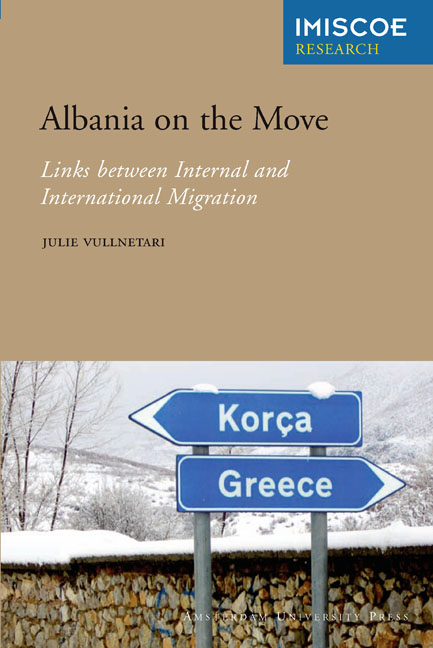Book contents
- Frontmatter
- Dedication
- Contents
- List of Tables, Figures and Photos
- Abbreviations
- Preface
- 1 Introduction
- 2 The Migration-Development Nexus
- 3 Albanian Migration and Development
- 4 Leaving Home: Migration Patterns and Dynamics
- 5 Across the Border: Migrants in Thessaloniki
- 6 Family, Migration and Socio-economic Change
- 7 Migration and Albania's Dynamic Transformation
- 8 Conclusions and Recommendations
- Notes
- References
- Other IMISCOE Titles
3 - Albanian Migration and Development
Published online by Cambridge University Press: 19 January 2021
- Frontmatter
- Dedication
- Contents
- List of Tables, Figures and Photos
- Abbreviations
- Preface
- 1 Introduction
- 2 The Migration-Development Nexus
- 3 Albanian Migration and Development
- 4 Leaving Home: Migration Patterns and Dynamics
- 5 Across the Border: Migrants in Thessaloniki
- 6 Family, Migration and Socio-economic Change
- 7 Migration and Albania's Dynamic Transformation
- 8 Conclusions and Recommendations
- Notes
- References
- Other IMISCOE Titles
Summary
Although Albania's borders were sealed off for nearly half a century during the communist period, migration from Albania was not without historical precedent: Albanians had migrated far and wide for centuries. However, the post-communist migration had specific features which make it one of the most noteworthy flows in the world. The aim of this chapter is to provide an overview of these migrations – both international and internal – and the ways they have been linked to development. To set the post-communist flows into perspective, I start with a brief historical account divided into two periods – migration until 1945 and during the communist years. The discussion of both international and internal movements after 1990 – as the main focus of the chapter – is structured around migration statistics, typologies and patterns, as well as destinations, migrants’ profiles, their lives and experiences. Their relationship with development is analysed through the impact of remittances, demography and spatial effects. Return migration is briefly elaborated in the closing sections.
Historical migration
Probably the earliest mass migration in the collective historical memory of Albanians took place in the second half of the fifteenth century, after the death of Albania's national hero Scanderbeg in 1467. His death and the capture of his stronghold in Krujë, in northern Albania, signified the fall of the Albanian lands to the Ottomans. In the aftermath, his family and other Albanian nobles fled to Italy, while others moved north to the Dalmatian coast and south to Greece. It is estimated that around 200,000 Albanians emigrated during this time (Tirta 1999: 97).
Five centuries under Ottoman rule were accompanied by further migration to other destinations. Many Albanian men fled to escape blood vendettas and the Ottoman persecution, yet others simply emigrated to escape poverty or to work in various trades and professions within the borderless Ottoman Empire. This emigration is known in the Albanian history and collective memory as kurbet. Originating from the Turkish gurbet, the word refers to the act of going away and being distant in a foreign land, usually for work (King & Vullnetari 2003).
- Type
- Chapter
- Information
- Albania on the MoveLinks between Internal and International Migration, pp. 59 - 106Publisher: Amsterdam University PressPrint publication year: 2012



